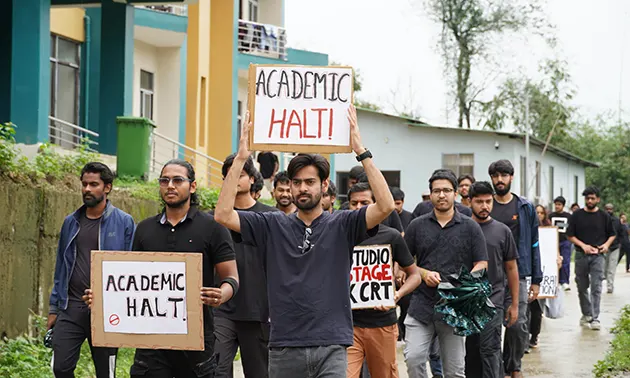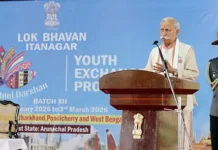ITANAGAR, 20 May: The first batch of students of Jote-based Film and Television Institute, Arunachal Pradesh (FTI-AP) has gone on an indefinite academic strike from 15 May, stating sustained administrative apathy and broken promises regarding basic infrastructural and academic necessities.
The students, who had previously held an academic halt in March this year, in a press release stated that despite repeated representations and assurances from the authorities, no visible progress has been made on critical issues. Their demands include provision of clean drinking water, 24/7 electricity, power backup, campus security, functioning classrooms, and digital access.
The students are also demanding the completion of key academic infrastructure, such as the classroom theatre and post-production blocks, which have been promised but are yet to be established.
They allege that they are being forced to attend classes in unsafe or unfinished spaces, and that frequent internet blackouts and unsafe water are affecting their health and academic performance.
Further, the students are seeking formal recognition and dignity, citing the institute’s lack of a formal name, logo, website, or even student ID cards. The absence of a full-time director on campus and under-staffing have also led to basic administrative functions being non-operational, they said.
The students are demanding immediate action on these issues, including the completion of essential infrastructure, functional academic spaces, safe drinking water, uninterrupted electricity, and formal accountability from the administration.
They have warned that they will not resume academic activities until their basic rights as students of a national institution are fulfilled.
AFC expresses solidarity with protesting students
Meanwhile, the Arunachal Film Collective (AFC) has expressed strong solidarity with the students of the FTI-AP.
In a letter addressed to the students, the AFC expressed “unwavering solidarity” with their demands for dignity, basic infrastructure, and a functional learning environment. The letter condemned the continued lack of clean drinking water, unreliable electricity, unsafe and unfinished classrooms, and the absence of campus security at one of India’s premier film institutions.
“That these conditions persist despite earlier protests and official assurances is not just disappointing – it is a disgrace,” the letter read.
The collective also raised serious concern over the lack of institutional leadership, identity cards, and a dedicated logo for FTI-AP. These issues, it said, “amount to the denial of [students’] identity and future as filmmakers and storytellers.”
The AFC has called on both the Government of Arunachal Pradesh and the Ministry of Information and Broadcasting to take immediate and decisive action to rectify what it described as “systemic failures.”
“Neglecting this institute is neglecting the aspirations of a new generation of filmmakers, not only from Arunachal but from across the country,” said Bindya Ete Nalo, a representative of the AFC.
The AFC is an informal network of filmmakers, artists, and storytellers from Arunachal, dedicated to promoting regional cinema and advocating the rights of those in the creative and educational film community.


